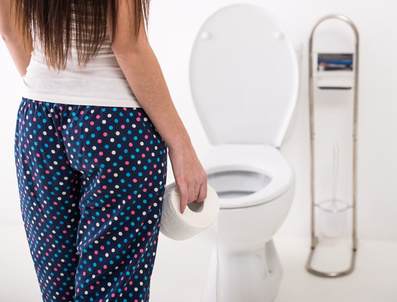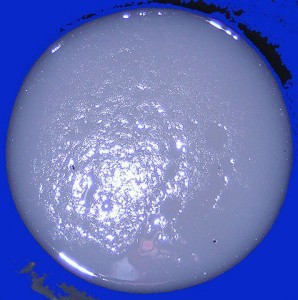Causes of Mucus in Bowel Movement (Constipation, Diarrhea)
Mucus is a substance that is widely produced through most parts of the body and particularly within cavities where it mainly serves as a lubricant. It is a translucent, jelly-like substance and produced in every part of the gut. It is therefore not uncommon for mucus that is produced by mucous glands that line the small and large intestine to appear in the stool. Most of the time it is never noticed but when excessive it may appear as a slimy and stringy substance coating the stool.
Normal Stool Mucus
A certain amount of mucus is present in normal stools of healthy persons. In fact part of the reason that normal stool is semi-soft is due to mucus, as well as water and fiber. However, when there is excessive amounts of mucus which is noticeable in other normal stool consistency then it could be due to one or more of the following conditions.

Hemorrhoids
Internal hemorrhoids are a common cause of mucus in the stool. The mucus may be seen to be coating the stool and noticed when wiping after a bowel movement. Other typical symptoms of hemorrhoids includes:
- Anal itching
- Blood in the stool
- Constipation
- Protrusion of the soft anal mucosa due to swelling
Intestinal Parasites
Intestinal parasites, like giardia or intestinal worms, may cause mucus in the stools and sometimes this may be the only symptom. Other symptoms may include:
- Chronic bloating
- Chronic diarrhea
Diagnosis. Stool test shows parasites, their parts, or their ova. Blood test shows increased eosinophils and IgE antibodies.
Small Intestinal or Colonic Polyps or Colorectal Cancer
Mucus in stools may sometimes be the only symptoms of small or large intestinal polyps. These polyps may be benign (non-cancerous) or malignant (cancerous). Bowel movement mucus can also be a symptom of colorectal cancer.
Mucus in Constipation
Mucus in hard stools may be due to:
- Constipation due to a sedentary lifestyle, insufficient water intake, medication that causes constipation as a side effect, low-fiber diet, anxiety or depression and several other known and unknown causes.
- Bowel obstruction from a polyp, cancer, volvulus, intussusception, or swallowed foreign object. It can also occur when movement through a section of the bowel ceases which is known as pseudo-obstruction.
Mucus in Diarrhea
Irritable Bowel Syndrome (IBS)
In many cases, the cause of mucus in stools (with diarrhea or constipation) occurs where no underlying disorder can be identified. In these cases the abnormal bowel habit, often accompanied by abdominal pain, is diagnosed as IBS (irritable bowel syndrome) which was previously referred to as spastic colon. IBS is considered to be caused by an abnormality in movement through the bowels but is not due to any disease. Acute flareups may occur with psychological stress and certain irritant/trigger foods.
Read more on foods to avoid in IBS.
Food Poisoning
In food poisoning (due to bacteria or parasites), there is nausea, vomiting and diarrhea with occasional mucus stools as well as the following:
- History of suspicious food eaten in previous 72 hours, especially where other people who had eaten the same foods are also affected.
- Bloating, abdominal cramps, occasional fever or, rarely blood in the stool.
Mucus and greenish diarrhea is common with infections caused by the giardia parasite that leads to giardiasis.
Food Intolerances
The term ‘food intolerance’ is a broad term that refers to conditions where the body cannot digest or absorb certain nutrients. It may also be incorrectly used to describe cases where foods trigger inflammation due to an immune-mediated allergu response. Therefore in these cases mucus often appears in stool due to:
- Fructose malabsorption
- Lactose intolerance (symptoms appear after dairy)
- Food allergies
- Celiac disease (symptoms appear after eating gluten containing cereals: wheat, barley and rye)
Diagnosis is primarily reached through an elimination diet whereby foods are removed from the diet one at a time and then gradually reintroduced. The other diagnostic method that may be considered is a breath test.
Small Intestinal Bacterial Overgrowth (SIBO)
Bacteria may overgrow in small intestine in various conditions fructose malabsorption, diabetes, systemic sclerosis, and other disorders with impaired gut motility. Normally bacteria is not found in large quantities within the small intestine, if at all. When these bacteria enter the small intestine, it may proliferate without any controlling measures that limit its population size. This is an overgrowth and not an infection.
Read more about SIBO.

Inflammatory Bowel Disease (IBD)
Inflammatory bowel disease is a chronic condition where there in inflammation of the wall of the gut and particularly in the large intestine. There are two types – Crohn’s disease and ulcerative colitis. In Crohn’s disease (especially when anal fissure or pelvic abscess are present), and ulcerative colitis, mucus in bowel movements (with or without diarrhea) is common. Other common findings in IBD:
- Low grade fever, malaise
- Blood in the stool
- Blood tests show elevated white blood cells
Diagnosis of IBD is made by colonoscopy and a biopsy of the colonic mucosa.
Diverticulitis
In diverticulitis, inflamed (usually infected) pouches appear in colon which is mainly due to long term straining at defecation in constipated people. It is more common in older people. Beside mucus, other symptoms include:
- Abdominal pain in lower left abdomen
- Diarrhea
- Bloating and gas
Pancreatic Disease
The pancrease secretes water, mucus, digestive enzymes and electrolytes into the duodenum (small intestine). Mucus in the stool may appear in the following pancreatic disorders:
- Papillary-mucinous tumor (rare)
In pancreatic disease there may be a problem with fat-digesting enzymes known as lipases. This may prevent fat digestion and the fats then pass out with stool. Fatty stool is known as steatorrhea and may be mistaken for mucus in the stools.
Cystic Fibrosis
Cystic fibrosis is a genetic disease, where salivary, bronchial, sweat, intestinal glands, and pancreas secrete excessive amount of dense mucus. Symptoms include:
- Mucous diarrhea from birth
- Coughing mucus
- Repeating respiratory or other infections
Diagnosis is made by a sweat test that shows increased amount of salt in the sweat.
Short Bowel Syndrome (SBS)
After surgery, where a considerable amount of small intestine was removed, mucous diarrhea may appear and persist for long periods, especially in small children. More about short bowel syndrome.
References
- Why Is There Mucus in My Stool? Health Line





